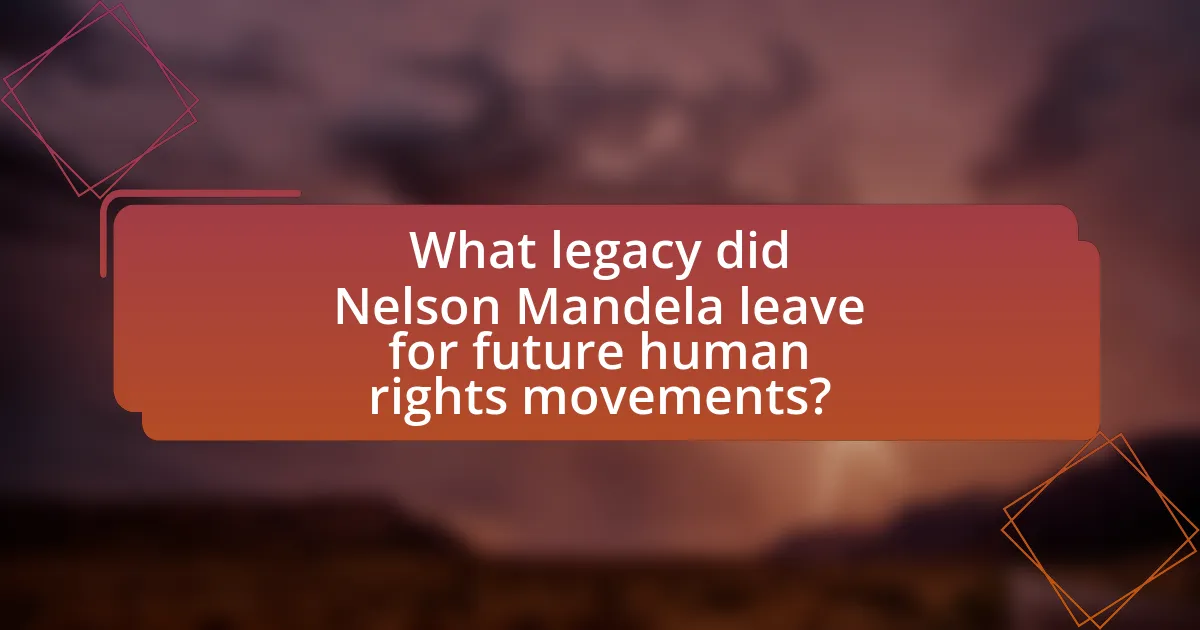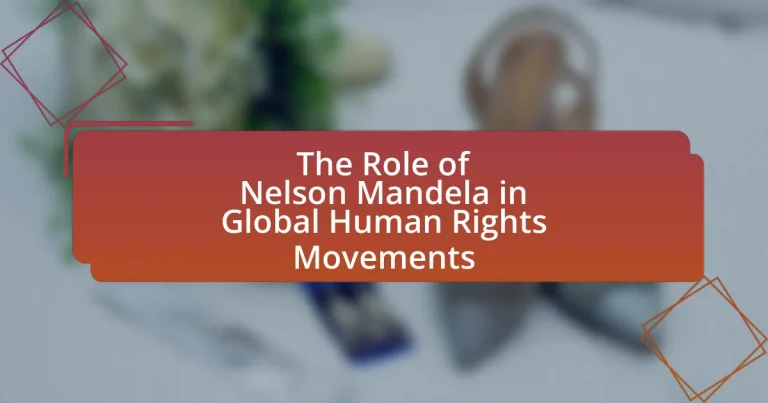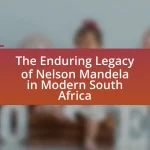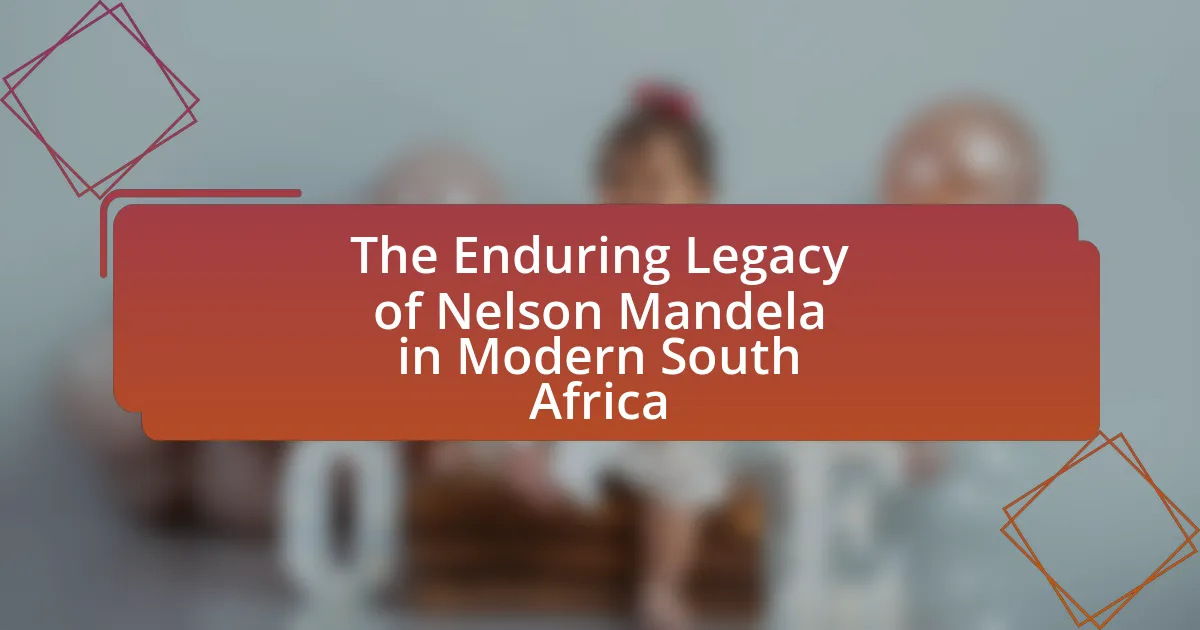Nelson Mandela is a pivotal figure in global human rights movements, renowned for his leadership in the anti-apartheid struggle and his advocacy for equality and justice. His 27 years of imprisonment drew international attention to the injustices faced by Black South Africans, inspiring global support for anti-apartheid efforts. Mandela’s emphasis on reconciliation and forgiveness, particularly through the Truth and Reconciliation Commission, set a precedent for addressing historical injustices. His legacy continues to influence contemporary human rights activism, as seen in organizations like the Nelson Mandela Foundation, which promotes social justice and human rights worldwide. The article explores Mandela’s early life, his role in the anti-apartheid movement, his philosophy on human rights, and the lasting impact of his leadership on global human rights advocacy.
What was Nelson Mandela’s impact on global human rights movements?
Nelson Mandela significantly advanced global human rights movements by exemplifying the struggle against apartheid and advocating for equality and justice. His leadership in the African National Congress and his 27 years of imprisonment drew international attention to the injustices faced by Black South Africans, galvanizing global support for anti-apartheid efforts. Mandela’s release in 1990 and subsequent election as South Africa’s first Black president in 1994 symbolized a triumph over oppression, inspiring human rights activists worldwide. His emphasis on reconciliation and forgiveness, particularly through the Truth and Reconciliation Commission, set a precedent for addressing historical injustices and promoting healing in post-conflict societies. Mandela’s legacy continues to influence human rights advocacy, as seen in the establishment of the Nelson Mandela Foundation, which promotes social justice and human rights globally.
How did Mandela’s early life influence his human rights activism?
Nelson Mandela’s early life significantly influenced his human rights activism by shaping his understanding of social injustice and the importance of equality. Growing up in the rural village of Mvezo, Mandela experienced the effects of apartheid policies firsthand, which instilled in him a deep sense of injustice. His education at the University of Fort Hare exposed him to political ideas and the African National Congress, further igniting his commitment to fighting for human rights. Additionally, Mandela’s involvement in the Defiance Campaign against apartheid laws in the 1940s marked a pivotal moment in his activism, demonstrating his resolve to challenge systemic oppression. These formative experiences laid the groundwork for his lifelong dedication to human rights and equality, ultimately leading him to become a global symbol of resistance against injustice.
What experiences shaped Mandela’s views on justice and equality?
Nelson Mandela’s views on justice and equality were profoundly shaped by his experiences of racial discrimination and oppression in South Africa. Growing up in the rural village of Mvezo, Mandela witnessed the systemic injustices faced by black South Africans under apartheid, which fueled his commitment to fighting for equality. His involvement in the African National Congress (ANC) and participation in anti-apartheid activism, including the Defiance Campaign in 1944, further solidified his belief in justice as a fundamental human right. Mandela’s 27 years of imprisonment, particularly on Robben Island, deepened his understanding of the struggle against oppression and the importance of reconciliation, ultimately shaping his vision for a democratic South Africa where justice and equality would prevail for all citizens.
How did Mandela’s education contribute to his activism?
Mandela’s education significantly contributed to his activism by equipping him with critical thinking skills and a deep understanding of social justice. His formal education at institutions like the University of Fort Hare exposed him to political ideas and philosophies that shaped his worldview. For instance, studying law provided him with the tools to challenge apartheid laws effectively. Additionally, his involvement in student politics during his university years fostered a commitment to activism, leading to his role in the African National Congress. This educational background laid the foundation for his strategic approach to dismantling systemic oppression in South Africa.
What role did Mandela play in the anti-apartheid movement?
Nelson Mandela was a central figure in the anti-apartheid movement, serving as a leader and symbol of resistance against racial segregation in South Africa. He co-founded the African National Congress Youth League in 1944, which aimed to mobilize young people against apartheid policies. Mandela’s leadership in the ANC’s armed wing, Umkhonto we Sizwe, marked a shift towards more militant resistance after peaceful protests were met with violence. His imprisonment for 27 years became a focal point for international anti-apartheid activism, galvanizing global support for the movement. Mandela’s eventual release in 1990 and subsequent election as South Africa’s first Black president in 1994 were pivotal moments that led to the dismantling of apartheid, demonstrating his crucial role in achieving racial equality and justice.
How did Mandela’s leadership style affect the movement’s success?
Mandela’s leadership style significantly contributed to the success of the anti-apartheid movement by promoting reconciliation and inclusivity. His emphasis on dialogue and negotiation, rather than violence, helped to unite various factions within the movement and gain broader support from the international community. For instance, Mandela’s willingness to engage with his former oppressors during the transition to democracy in South Africa facilitated a peaceful resolution to decades of conflict, which was crucial in avoiding civil war. This approach is exemplified by his leadership during the negotiations that led to the end of apartheid, where he advocated for a multi-racial democracy, thereby ensuring a more stable and inclusive political environment.
What strategies did Mandela employ to mobilize support against apartheid?
Nelson Mandela employed several key strategies to mobilize support against apartheid, including grassroots organizing, international advocacy, and the use of nonviolent resistance. He focused on building a broad coalition of anti-apartheid groups, which included labor unions, student organizations, and religious institutions, to create a unified front against racial segregation. Mandela also traveled extensively to garner international support, highlighting the injustices of apartheid and calling for economic sanctions against the South African government. His leadership in the African National Congress (ANC) and his ability to articulate the struggle for freedom resonated globally, leading to increased pressure on the apartheid regime. These strategies were instrumental in raising awareness and mobilizing both domestic and international opposition to apartheid, ultimately contributing to its dismantling in the early 1990s.
How did Mandela’s imprisonment affect global perceptions of human rights?
Mandela’s imprisonment significantly heightened global awareness and advocacy for human rights. His 27 years of incarceration became a symbol of the struggle against apartheid and injustice, galvanizing international movements and campaigns for human rights. The global outcry for his release, exemplified by the “Free Nelson Mandela” campaign, mobilized millions and drew attention to the broader issues of racial discrimination and oppression. This heightened visibility contributed to the establishment of anti-apartheid sanctions and increased pressure on the South African government, ultimately influencing global human rights discourse and inspiring similar movements worldwide.
What international campaigns emerged during Mandela’s imprisonment?
During Nelson Mandela’s imprisonment, significant international campaigns emerged, notably the “Free Nelson Mandela” campaign and the anti-apartheid movement. The “Free Nelson Mandela” campaign, launched in 1980, mobilized global support for his release and raised awareness about the injustices of apartheid in South Africa. This campaign included high-profile events, such as concerts and rallies, and garnered endorsements from influential figures and organizations worldwide, including the United Nations, which called for sanctions against the apartheid regime. The anti-apartheid movement, which gained momentum during Mandela’s incarceration, involved various grassroots organizations and political groups advocating for the end of apartheid, leading to widespread protests and boycotts against South African goods. These campaigns played a crucial role in pressuring the South African government to negotiate with Mandela and ultimately contributed to the dismantling of apartheid.
How did Mandela’s release influence global human rights advocacy?
Mandela’s release in 1990 significantly influenced global human rights advocacy by symbolizing the triumph over oppression and inspiring movements worldwide. His freedom galvanized international efforts to combat apartheid and highlighted the importance of civil rights, leading to increased activism and awareness around human rights issues. The global anti-apartheid movement, which gained momentum during his imprisonment, showcased the power of collective action and solidarity, prompting countries to adopt policies that supported human rights initiatives. Mandela’s subsequent leadership in promoting reconciliation and social justice further established him as a pivotal figure in advocating for human rights, encouraging nations to prioritize these values in their own policies and practices.
What are the key principles of Mandela’s human rights philosophy?
Nelson Mandela’s human rights philosophy is grounded in the principles of equality, justice, and dignity for all individuals. He emphasized the importance of fighting against oppression and discrimination, advocating for the rights of marginalized groups, particularly in the context of apartheid in South Africa. Mandela believed that true freedom is achieved through collective action and solidarity among oppressed peoples, as evidenced by his leadership in the African National Congress and his commitment to non-violent resistance. His philosophy is further validated by his famous statement, “For to be free is not merely to cast off one’s chains, but to live in a way that respects and enhances the freedom of others,” highlighting the interconnectedness of human rights.
How did Mandela define human rights in the context of his work?
Nelson Mandela defined human rights as the fundamental entitlements that every individual possesses, emphasizing dignity, equality, and freedom. In his work, Mandela highlighted that human rights are universal and inalienable, asserting that the struggle against apartheid was intrinsically linked to the broader fight for human rights globally. His advocacy was rooted in the belief that true freedom cannot exist without the respect for human rights, as demonstrated by his leadership in the African National Congress and his efforts to dismantle systemic oppression in South Africa. Mandela’s commitment to human rights is evidenced by his role in the drafting of the South African Constitution, which enshrines a comprehensive bill of rights, reflecting his vision of a society where all individuals are treated with respect and justice.
What specific rights did Mandela advocate for during his life?
Nelson Mandela advocated for several specific rights during his life, primarily focusing on human rights, equality, and social justice. He championed the right to freedom from racial discrimination, emphasizing the need for equal rights for all individuals regardless of race, as evidenced by his leadership in the African National Congress and his role in the anti-apartheid movement. Mandela also fought for the right to education, believing that access to quality education is essential for empowerment and social mobility. His commitment to economic rights was evident in his advocacy for fair labor practices and the right to a decent standard of living. These rights were foundational to his vision of a democratic and inclusive South Africa, as articulated in the Freedom Charter of 1955, which he endorsed, calling for a society where all people would enjoy equal rights and opportunities.
How did Mandela’s philosophy influence other human rights leaders?
Mandela’s philosophy of reconciliation and non-violence significantly influenced other human rights leaders by promoting the idea that peaceful dialogue can lead to social change. His approach, exemplified during the transition from apartheid to a democratic South Africa, demonstrated that addressing grievances through negotiation rather than conflict can yield positive outcomes. Leaders such as Martin Luther King Jr. and Desmond Tutu adopted similar principles, emphasizing forgiveness and unity in their movements. Mandela’s emphasis on equality and justice inspired global figures like Malala Yousafzai, who advocates for education and women’s rights, reflecting Mandela’s belief in the power of education as a tool for liberation. His legacy continues to resonate, encouraging leaders to pursue human rights through peaceful means and fostering a global culture of respect and dignity.
Why is Mandela considered a symbol of peace and reconciliation?
Nelson Mandela is considered a symbol of peace and reconciliation due to his pivotal role in ending apartheid in South Africa and promoting national unity. After spending 27 years in prison for his anti-apartheid activism, Mandela emerged as a leader who advocated for forgiveness rather than revenge, emphasizing the importance of dialogue and understanding among different racial groups. His leadership during the transition from apartheid to a democratic South Africa, particularly through the establishment of the Truth and Reconciliation Commission, showcased his commitment to healing a divided nation. Mandela’s efforts earned him the Nobel Peace Prize in 1993, further solidifying his legacy as a global icon of peace and reconciliation.
What actions did Mandela take to promote forgiveness and unity in South Africa?
Nelson Mandela promoted forgiveness and unity in South Africa primarily through the establishment of the Truth and Reconciliation Commission (TRC) in 1995. The TRC aimed to address the atrocities committed during apartheid by allowing victims to share their experiences and perpetrators to confess their crimes without fear of prosecution, fostering a culture of understanding and healing. Mandela also emphasized reconciliation in his speeches and actions, advocating for a “rainbow nation” where all South Africans, regardless of their background, could coexist peacefully. His leadership during the transition from apartheid to a democratic society exemplified his commitment to unity, as he worked with former adversaries, including F.W. de Klerk, to build a new nation based on mutual respect and cooperation.
How did Mandela’s approach to conflict resolution impact global movements?
Mandela’s approach to conflict resolution significantly influenced global movements by promoting reconciliation over retribution. His emphasis on dialogue and understanding, exemplified during South Africa’s transition from apartheid, inspired leaders worldwide to adopt non-violent strategies in addressing social and political conflicts. For instance, Mandela’s establishment of the Truth and Reconciliation Commission in 1995 served as a model for countries like Rwanda and Sierra Leone, which faced their own post-conflict challenges. This approach demonstrated that healing and unity could be achieved through forgiveness and collective memory, thereby reshaping the discourse on human rights and conflict resolution globally.

What legacy did Nelson Mandela leave for future human rights movements?
Nelson Mandela’s legacy for future human rights movements is characterized by his unwavering commitment to justice, equality, and reconciliation. His leadership in the anti-apartheid struggle in South Africa demonstrated the power of peaceful resistance and negotiation, which inspired global movements advocating for civil rights and social justice. Mandela’s emphasis on forgiveness and unity, particularly during his presidency, set a precedent for addressing historical injustices through dialogue rather than retribution. His global influence is evidenced by the widespread adoption of his principles in various human rights campaigns, such as the fight against racial discrimination and the promotion of democratic governance, highlighting his role as a symbol of resilience and hope for oppressed communities worldwide.
How has Mandela’s legacy influenced contemporary human rights activism?
Mandela’s legacy has profoundly influenced contemporary human rights activism by establishing a global framework for justice, equality, and reconciliation. His commitment to non-violence and dialogue, exemplified during his fight against apartheid, has inspired activists worldwide to adopt similar approaches in their struggles for human rights. For instance, the principles outlined in his autobiography, “Long Walk to Freedom,” emphasize the importance of forgiveness and unity, which have become foundational in movements addressing systemic injustices today. Additionally, Mandela’s role in the establishment of the Truth and Reconciliation Commission in South Africa serves as a model for other nations grappling with past atrocities, demonstrating the effectiveness of restorative justice in healing communities. His influence is evident in various contemporary movements, such as Black Lives Matter and climate justice initiatives, where activists invoke his teachings to advocate for systemic change and social equity.
What organizations continue to promote Mandela’s ideals today?
Organizations that continue to promote Mandela’s ideals today include the Nelson Mandela Foundation, Amnesty International, and the African National Congress (ANC). The Nelson Mandela Foundation focuses on social justice and human rights, advocating for Mandela’s legacy through education and community engagement. Amnesty International campaigns for human rights globally, reflecting Mandela’s commitment to justice and equality. The ANC, as the political party that Mandela led, continues to uphold his principles in South Africa, emphasizing democracy and social change. These organizations actively work to advance the values Mandela championed throughout his life.
How do current leaders draw inspiration from Mandela’s life and work?
Current leaders draw inspiration from Nelson Mandela’s life and work by emulating his commitment to justice, reconciliation, and equality. Mandela’s ability to unite a divided nation after decades of apartheid serves as a powerful example for leaders facing social and political challenges. His emphasis on forgiveness and dialogue, as demonstrated during the Truth and Reconciliation Commission, illustrates the importance of addressing historical injustices while fostering national healing. Additionally, Mandela’s advocacy for human rights and social justice resonates with contemporary movements, encouraging leaders to prioritize equity and inclusivity in their policies. His legacy is a reminder that transformative leadership requires resilience, moral courage, and a dedication to the greater good.
What lessons can be learned from Mandela’s approach to human rights?
Mandela’s approach to human rights teaches the importance of resilience, forgiveness, and dialogue in the pursuit of justice. His 27 years of imprisonment exemplified unwavering commitment to equality and human dignity, demonstrating that enduring hardship can lead to transformative change. Mandela’s emphasis on reconciliation over retribution, particularly during the Truth and Reconciliation Commission in South Africa, highlighted the necessity of healing societal wounds to foster unity. Furthermore, his ability to engage with adversaries, including former oppressors, underscores the value of dialogue in resolving conflicts and building inclusive societies. These lessons are evident in Mandela’s legacy, which continues to inspire global human rights movements today.
How can individuals contribute to human rights advocacy in their communities?
Individuals can contribute to human rights advocacy in their communities by engaging in awareness campaigns and grassroots organizing. By educating themselves and others about human rights issues, individuals can foster a culture of respect and understanding. For instance, community workshops and discussions can highlight local human rights violations, encouraging collective action. Historical evidence shows that grassroots movements, such as those led by Nelson Mandela, effectively mobilized communities to challenge systemic injustices, demonstrating the power of local advocacy in driving change.
What best practices can be derived from Mandela’s strategies for activism?
Best practices derived from Mandela’s strategies for activism include the emphasis on reconciliation, the importance of non-violent resistance, and the power of grassroots mobilization. Mandela prioritized reconciliation over revenge, as seen in his leadership during South Africa’s transition from apartheid, fostering unity among divided communities. His commitment to non-violence was evident in his advocacy for peaceful protests and negotiations, which ultimately led to the end of apartheid without widespread bloodshed. Additionally, Mandela recognized the significance of grassroots mobilization, engaging ordinary citizens in the struggle for rights, which empowered communities and created a broad-based support network for change. These strategies have been validated by historical outcomes, demonstrating their effectiveness in achieving social justice and human rights advancements.




